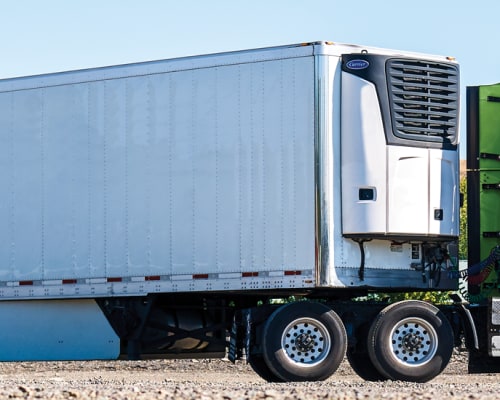How Transport Refrigeration Company Solutions Ensure Fresh Deliveries
Exactly How Refrigerated Trucks Run to Guarantee Safe and Efficient Distribution of Perishable Item
Refrigerated vehicles play a vital function in the supply chain, guaranteeing that subject to spoiling goods are transported safely and successfully. Utilizing sophisticated refrigeration innovations and robust insulation, these cars preserve specific temperature control, which is important for protecting the high quality of sensitive products.
Introduction of Refrigerated Trucks
Cooled trucks, commonly described as reefer vehicles, play a critical function in the transport of subject to spoiling items throughout numerous markets. These specialized cars are designed to maintain specific temperature level arrays, making certain that items such as fresh produce, dairy items, meat, and drugs continue to be risk-free for usage and effective usage. The procedure of refrigerated vehicles is crucial in minimizing putridity and extending the service life of temperature-sensitive products.
Reefer vehicles are furnished with insulated freight areas that are qualified of sustaining reduced temperatures, which can be adjusted according to the kind of goods being moved. The automobiles generally make use of a refrigeration system powered either by the vehicle's engine or an independent source of power, permitting regular temperature control throughout transit.
Along with temperature maintenance, these vehicles are typically designed with sophisticated surveillance systems to track the interior setting, guaranteeing conformity with health and wellness laws. Cooled trucks contribute dramatically to the supply chain, making it possible for timely distributions to sellers, restaurants, and consumers. Their crucial function highlights the relevance of reputable transport remedies in today's international market, where freshness is paramount.
Secret Refrigeration Technologies
Maintaining ideal temperature control in refrigerated trucks counts on several key refrigeration technologies that boost performance and integrity. Among the most common systems is the vapor-compression refrigeration cycle, which uses a cooling agent to take in warm from the vehicle's interior, decreasing the temperature level. This process involves a compressor, condenser, expansion valve, and evaporator, working in tandem to flow the refrigerant and maintain a consistent environment.
An additional remarkable technology is making use of eutectic plates, which keep and launch thermal power. These plates are loaded with a phase-change product that strengthens at a particular temperature level, giving a secure air conditioning resource. This method not just enhances power effectiveness but additionally reduces the demand for constant power supply during transit.
Furthermore, advanced insulation materials, such as polyurethane foam, considerably boost the thermal performance of cooled vehicles, lessening temperature level variations during filling and dumping. Some modern-day cooled vehicles additionally include telematics systems, enabling real-time monitoring of temperature and efficiency, therefore making sure compliance with safety and security requirements. Together, these modern technologies guarantee the secure transportation of disposable items while enhancing functional performance and minimizing power usage.
Temperature Control Devices
Reliable temperature level control mechanisms are vital in ensuring the integrity of perishable products throughout transportation. Refrigerated trucks utilize sophisticated modern technologies to keep constant temperature arrays, protecting against wasting and ensuring product safety - refrigerated truck companies.
Additionally, contemporary chilled vehicles are furnished with electronic thermometers and programmable temperature level monitoring systems. These systems enable for real-time tracking of inner temperature levels, giving informs if the temperature level differs the established range. This capacity is important for compliance with health and wellness and safety and security regulations.
Insulation additionally plays an essential role in temperature control. Premium insulation materials decrease warm exchange, maintaining the preferred inner problems. Air movement management within the cargo location is engineered to ensure consistent temperature level distribution, protecting against hotspots that might jeopardize item stability.
Best Practices for Filling

First, it is necessary to pre-cool the truck before packing. This technique allows the temperature level control system to maintain, developing a perfect atmosphere for disposable products. Next, items should be loaded in a manner that advertises airflow. Avoid overwhelming and blocking vents, as this can bring about temperature variations and hotspots.
Using pallets or shelving can aid in organizing items, guaranteeing that larger products are positioned at the bottom to stop squashing lighter items. Furthermore, it is important to set apart various kinds of goods, especially those with varying temperature requirements, to stop cross-contamination and putridity.
Finally, securing the load with straps or internet will avoid movement during transportation, thereby minimizing the danger of damages and preserving the honesty of temperature-sensitive items. By adhering to these ideal techniques, operators can make certain efficient and risk-free shipment of perishable items while optimizing the efficiency of their chilled trucks.
Obstacles and Solutions in Transport
One considerable concern is temperature changes, which can happen due to tools malfunction or incorrect loading techniques. Additionally, roadway problems and delays can additionally exacerbate temperature level control issues, specifically throughout expanded transportation times.
To deal with these obstacles, carrying out durable tracking systems is important. Advanced telemetry can supply real-time temperature data, notifying drivers to any type of anomalies. Normal maintenance of refrigeration units ensures ideal efficiency and minimizes the threat of break downs. Moreover, training workers on finest loading and dumping practices can reduce the threat of temperature variances.
Another secret option involves course optimization. Utilizing GPS and web traffic administration innovations can aid chauffeurs select the most efficient paths, lowering transit times and decreasing direct exposure to negative problems. Teaming up with reputable logistics companions who prioritize chilly chain honesty is also essential for making sure that items stay within needed temperature ranges.

Conclusion
Finally, refrigerated vehicles play a vital duty in the safe and effective transportation of subject to spoiling products. Utilizing sophisticated refrigeration modern technologies and reliable temperature control systems guarantees that products remain within required temperature arrays. Abiding by ideal techniques in loading and course optimization additionally improves shipment performance. Attending to challenges via cutting-edge services is important for keeping conformity with health regulations, inevitably securing the integrity of delicate items throughout the supply chain.
